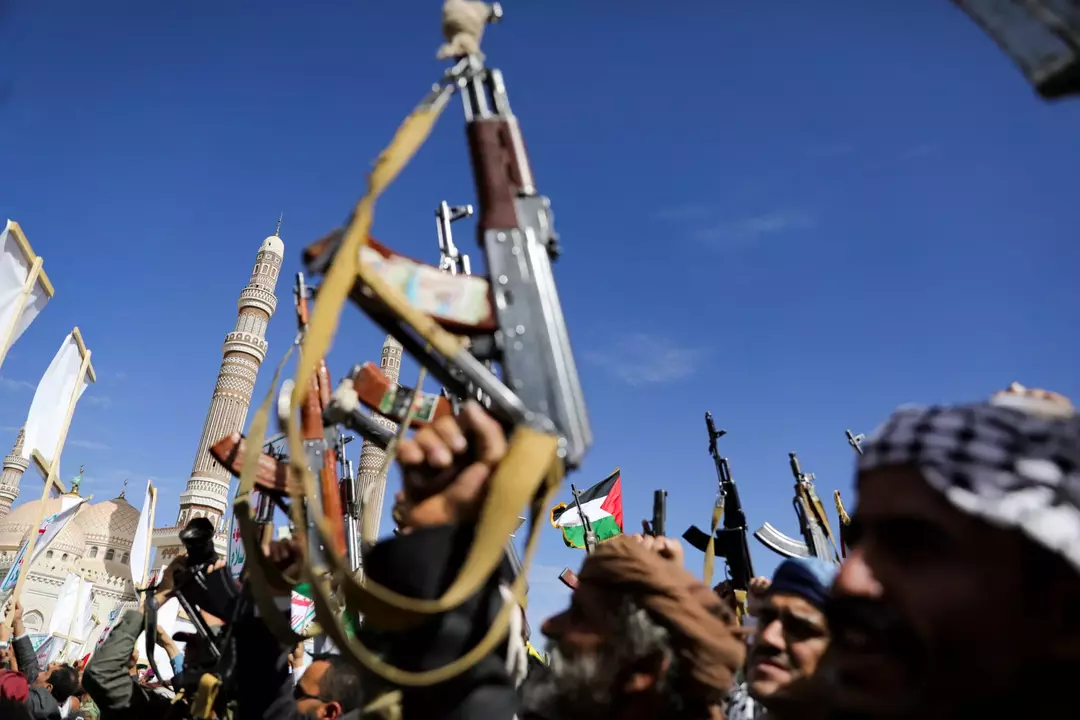Redesignation of Yemen’s Houthis as a Foreign Terrorist Organization: Implications and Analysis
The recent executive order by President Donald Trump to redesignate Yemen’s Houthis as a foreign terrorist organization is a significant move in the ongoing Red Sea shipping crisis. This designation, which follows a period of humanitarian concerns, aims to enhance maritime security and address global inflation pressures. This article delves into the background of the Houthis, the escalating attacks on commercial shipping, Iran’s role, and the implications of Trump’s executive order.
Background on the Houthis
The Houthis, formally known as Ansar Allah, are a Zaidi Shia militant group based in Yemen. They gained prominence following the 2011 uprising against the Yemeni government, which led to a power vacuum. The group has since become a significant player in the Yemeni conflict, backing various factions and engaging in military operations [Source: Wikipedia – Houthi movement]. In 2014, the Houthis captured the Yemeni capital, Sana’a, and established a government, which has been recognized by some countries and international organizations. However, the Houthis’ rule has been marked by human rights abuses and a lack of governance, leading to widespread criticism and international isolation [Source: Brookings – Who are the Houthis, and why are we at war with them?].
The Houthis’ role in the Yemeni conflict has been complex and multifaceted. They have been accused of committing war crimes and human rights violations, including the use of child soldiers and the targeting of civilians. Despite this, the Houthis have managed to maintain a degree of control over large parts of Yemen, making them a formidable force in the region [Source: Al Jazeera – Who are the Houthis? A simple guide to the Yemeni group].
Escalating Attacks on Commercial Shipping
The Red Sea shipping crisis has escalated significantly in recent years, with the Houthis playing a central role in the attacks on commercial shipping. The group has launched numerous attacks on vessels, including oil tankers and cargo ships, targeting both military and civilian assets. The attacks have had a profound impact on global maritime trade. The Red Sea is a crucial shipping lane, connecting Asia, Africa, and Europe. Disruptions in this region can have far-reaching consequences, affecting the supply chains of numerous industries, including oil and gas, manufacturing, and agriculture.
The Houthis’ attacks have been driven by a combination of political and strategic factors. The group seeks to disrupt global trade routes as a means of exerting pressure on its enemies and gaining leverage in the Yemeni conflict. Additionally, the Houthis have been backed by Iran, which provides them with military support and financial assistance [Source: Wikipedia – Houthi movement].
Iran’s Role and Support for the Houthis
Iran’s backing of the Houthis has been a significant factor in the escalation of the Red Sea shipping crisis. The Islamic Revolutionary Guard Corps Quds Force, a branch of Iran’s military, has provided the Houthis with weapons, training, and logistical support. This assistance has enabled the Houthis to conduct their attacks on commercial shipping with impunity. The strategic significance of the Red Sea region to Iran makes it a crucial ally for the Houthis.
The Red Sea is a vital waterway for Iran’s energy exports, and any disruption in shipping could have severe economic consequences for the country. Iran’s support for the Houthis also serves its broader geopolitical interests, as it seeks to counterbalance the influence of regional rivals, such as Saudi Arabia and the United Arab Emirates. Iran’s involvement in the Red Sea shipping crisis has raised concerns about regional stability and the potential for escalation in the conflict. The Houthis’ attacks have been condemned by many countries, including the United States, which has imposed sanctions on Iran in response. The situation in the Red Sea has also become entangled with the broader Israel-Hamas conflict, with the Houthis providing military support to Hamas in the Gaza Strip [Source: Al Jazeera – Who are the Houthis? A simple guide to the Yemeni group].
Executive Order Details
Executive Order 14172, signed by President Donald Trump on January 22, 2025, aims to redesignate Yemen’s Houthis as a foreign terrorist organization. This move is part of a broader strategy to enhance maritime security in the Red Sea and address the escalating attacks on commercial shipping. The executive order requires the Secretary of State to submit a report within 30 days, following consultation with intelligence and treasury officials. The report will assess the Houthis’ activities, their role in the Red Sea shipping crisis, and the potential implications of redesignating them as a foreign terrorist organization.
The executive order also directs USAID to review its partnerships in Yemen, focusing on organizations that may have made payments to Houthi-controlled entities or those that have downplayed the group’s actions. This review is intended to ensure that U.S. aid is not inadvertently supporting terrorist activities.
Historical Context and Previous Designations
The Houthis, officially known as Ansar Allah, emerged in the 1990s as a Zaydi Shia Islamist political and military organization in Yemen [Source: Wikipedia – Houthi movement]. Their roots can be traced back to the late 1980s, when they began as a movement to protect and revive Zaydi religious and cultural traditions [Source: Council on Foreign Relations – Who Are Yemen’s Houthis?]. The group has since evolved into a significant actor in the Yemeni Civil War, which began in 2014 [Source: Britannica – Houthi movement].
Trump’s executive order to redesignate the Houthis as a foreign terrorist organization marks a pivotal moment in addressing the Red Sea shipping crisis. While it aims to enhance maritime security, it also raises concerns about potential humanitarian impacts and future U.S. policy towards the Houthis. The ongoing impact on maritime security and global trade will be closely monitored.


Leave a Reply